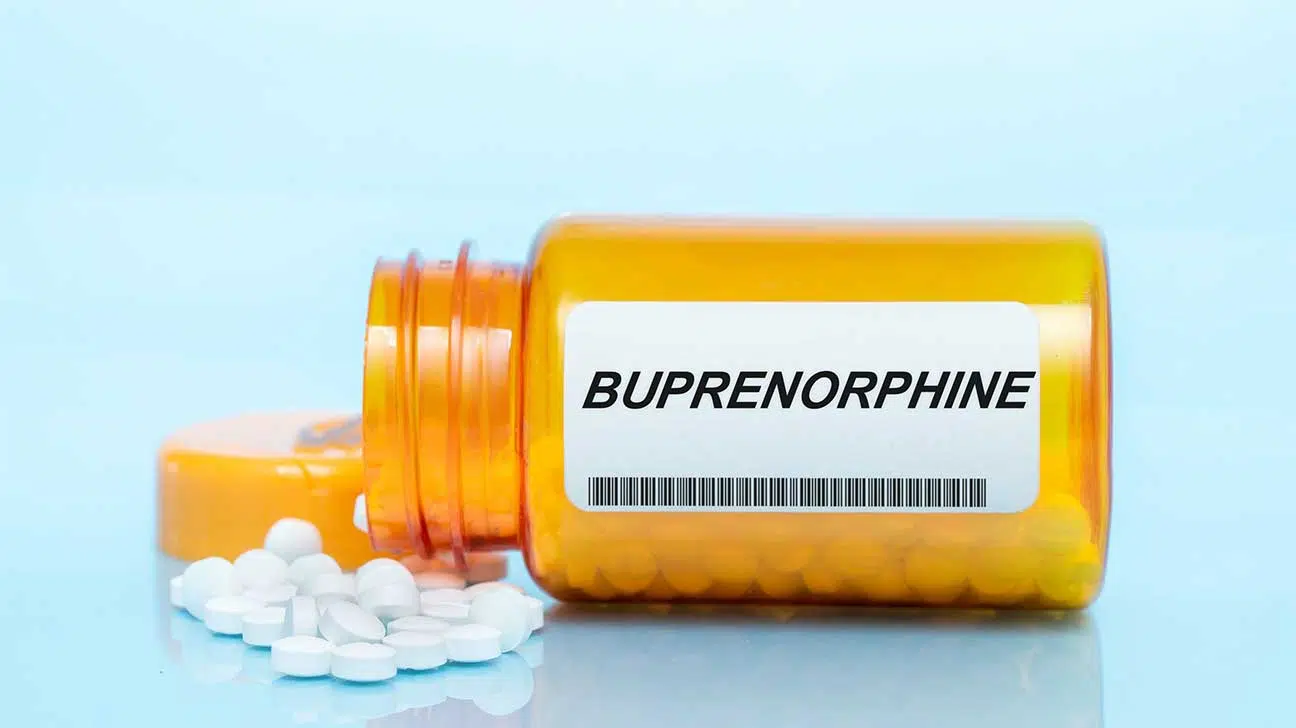
Buprenorphine is a high affinity partial opioid agonist that can be used to treat addiction to opioids such as fentanyl, oxycodone (OxyContin), and other prescription opioids.
It has only been approved as treatment for opioid use disorders for about a year now, so it’s a fairly novel treatment.
It is also known as Suboxone, a combination of buprenorphine and naloxone that can be used to prevent opioid overdose as well as prevent abuse of the substance.
The drug is approved by the Food and Drug Administration (FDA) and is often used as medication-assisted treatment (MAT) to help people through their withdrawal symptoms. Other similar medications used in MAT include naltrexone, an opioid antagonist.
Suboxone works by interacting with your brain the same way opioids do but without the high or dangerous risks. This makes your brain think it’s getting the effects of opioids, reducing withdrawal symptoms.
As a disclaimer, it is possible to build a tolerance to Suboxone. Tolerance means you need more of the substance to feel the same effects that you did with a lower dosage.
Factors That Lead To Suboxone Tolerance
Tolerance to buprenorphine can happen for a number of reasons. Some factors may make you more likely to develop a tolerance.
Opioid Receptor Signals
Suboxone works by partially binding to the same receptors in your brain that opioids do. If you continue to use Suboxone, your brain and body may start to build an opioid tolerance.
Large Doses
Taking large doses of buprenorphine can also lead to developing a tolerance. This is because your body may get used to high doses quickly, needing more to feel the drug’s effects later on.
It is recommended to start with low doses of buprenorphine to avoid building a tolerance too quickly.
Chronic Pain
In some cases, buprenorphine is used to help treat chronic pain. This is because it is an analgesic, which is the class of drugs that relieve pain. It can also have a sedative effect.
Like other medications used to treat pain, you may need more over time to decrease the pain.
Ceiling Effect
Lastly, buprenorphine has what is called a “ceiling effect.” This means that at a certain dosage, 24 mg to be exact, the effects of buprenorphine stop increasing.
In other words, if you take more than that dose, you won’t feel increased effects like analgesia. The ceiling effect is also helpful in preventing people from overdosing.
However, if your withdrawal symptoms cannot be managed with the particular dosage, you won’t be able to take more to feel better.
Does Suboxone Use Lead To Lowered Opioid Tolerance?
Using Suboxone or other forms of buprenorphine has not been shown to lower your tolerance to opioids.
This is because Suboxone is a partial agonist rather than a full agonist like methadone. However, buprenorphine can decrease opioid dependence, making it successful in addiction treatment.
Side Effects Of Buprenorphine Tolerance
As with any other drug and tolerance to that drug, the use of buprenorphine is associated with various side effects.
Constipation
One common side effect associated with using buprenorphine is constipation. If you experience constipation caused by Suboxone, try drinking more fluids, eating more fiber, and exercising.
Respiratory Depression
Building a tolerance to buprenorphine can also lead to partial respiratory depression. Respiratory depression is a condition in which you breathe too slowly or ineffectively, which can be fatal.
However, when combined with naloxone to create Suboxone, this side effect is much less likely.
Physical Dependence
As you develop a tolerance to buprenorphine, you may also develop a physical dependence on the substance.
This is a serious issue and may require additional treatment as well as help from a medical professional to help you achieve discontinuation of buprenorphine.
How Tolerance To Suboxone Can Affect Opioid Withdrawal
Developing a tolerance to Suboxone can affect medication-assisted treatment used for opioid withdrawal.
Because there is a ceiling effect with Suboxone, if you develop a tolerance to the highest dosage of the drug that enhances its effects, you won’t be able to take more to treat withdrawal symptoms.
In other words, tolerance to Suboxone can make it harder to treat the pain and cravings that come along with opioid withdrawal when buprenorphine treatment is being used.
Treatment Programs For Opioid Use Disorder
Opioid addiction is a serious medical condition that requires professional monitoring and help from a healthcare expert.
It can be challenging to find a treatment facility you know you can trust and that will provide the right treatment for you.
Luckily, AddictionResource.net is dedicated to helping you find the best treatment centers in your area.
You’ll be able to find treatment for all kinds of substance use disorders in any state across the country.
We make sure to choose qualified facilities that will offer addiction treatment suited for your individual needs.
This might include medication-assisted treatment, behavioral therapy, detox programs, and inpatient drug rehab.
Find Substance Use Disorder Treatment Services
If you or your loved one is ready to move on from drug use, call our helpline at AddictionResource.net to find the best treatment center near you today.
Addiction Resource aims to provide only the most current, accurate information in regards to addiction and addiction treatment, which means we only reference the most credible sources available.
These include peer-reviewed journals, government entities and academic institutions, and leaders in addiction healthcare and advocacy. Learn more about how we safeguard our content by viewing our editorial policy.
- National Institute on Drug Abuse (NIDA) — Buprenorphine
https://archives.drugabuse.gov/buprenorphine - Substance Abuse and Mental Health Services Administration (SAMHSA) — Buprenorphine
https://www.samhsa.gov/medication-assisted-treatment/medications-counseling-related-conditions/buprenorphine#:~:text=Buprenorphine%20is%20an%20opioid%20partial,buprenorphine%20is%20safe%20and%20effective. - Substance Abuse and Mental Health Services Administration (SAMHSA) — The Facts About Buprenorphine for Treatment of Opioid Addiction
https://store.samhsa.gov/sites/default/files/d7/priv/sma14-4442.pdf - U.S. National Library of Medicine: PubMed — Buprenorphine: How to Use It Right
https://pubmed.ncbi.nlm.nih.gov/12738351/ - U.S. Department of Health and Human Services — HHS Releases New Buprenorphine Practice Guidelines, Expanding Access to Treatment for Opioid Use Disorder
https://www.hhs.gov/about/news/2021/04/27/hhs-releases-new-buprenorphine-practice-guidelines-expanding-access-to-treatment-for-opioid-use-disorder.html


